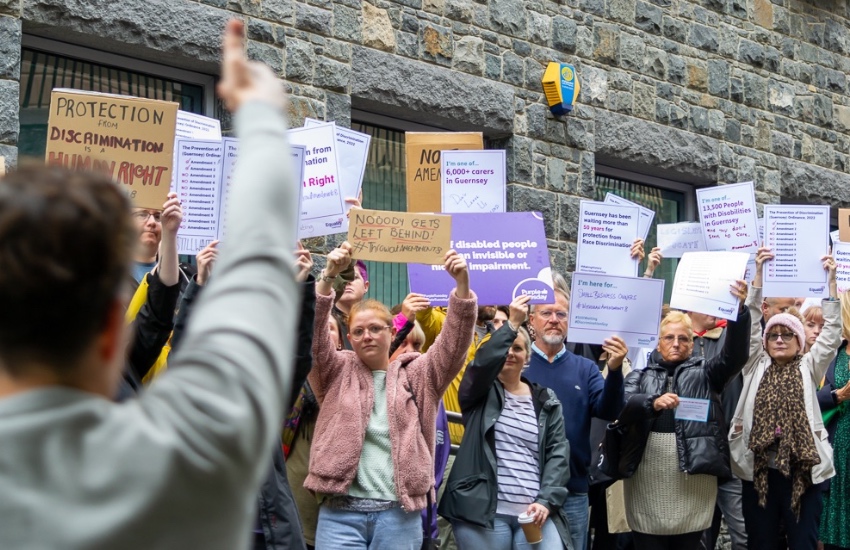


Companies of all sizes will be prevented from discriminating against carers and people with a disability if the States approve a draft anti-discrimination law which they are currently debating.
An amendment to exempt firms with five staff or fewer from large parts of the law was rejected by 9 votes to 26 in the States this afternoon.
The proposers of the amendment, Deputies Chris Blin and David De Lisle, said they wanted to "reduce financial and management pressures for businesses which are too small to absorb the impact of these changes" proposed in the draft law.
But the sponsors of the draft law, the Committee for Employment & Social Security, warned that approving the amendment and allowing small firms to discriminate against people with a disability and carers would have "significantly undermined the purpose and effectiveness of the legislation and let down disabled islanders and carers who have waited a very long time for this legislation".

Pictured: Deputies Chris Blin and (inset) David De Lisle lost their attempt to exempt smaller businesses from a draft law to outlaw discrimination against people with a disability and carers.
Opening debate on his amendment, Deputy Blin insisted that he was "not against" anti-discrimination legislation but said he "would like it to be proportionate".
"We are not adopting well-established and proven legislation from the UK or Jersey. This [draft law] is unique. It has definitions of disability which are much broader and specific and we have been told can be compared only with Ireland and Australia with other provisions having been drawn from a variety of jurisdictions," said Deputy Blin.
"The result is that we have a complex, far-reaching [law] for which there are no specific precedents that can be adopted as this specific legislation does not exist elsewhere. Deputy De Lisle and I have laid this amendment because we are concerned about the impact and burden of this unprecedented legislation and its practical implementation on the more vulnerable, small, very small in some cases, locally-owned and -managed businesses who are already currently facing incredibly difficult and uncertain trading conditions and need help rather than be weighed down by more regulation.
"These small businesses do not have in-house human resources departments or in-house legal counsel. In fact, they don't even have the resources or time to deal with these potentially complex situations and laws. As much as I encourage having the anti-discrimination law, one also has to accept that some of the smaller businesses can be vulnerable to exploitation and abuse of process and what we don't want to see is them drowning in red tape. The businesses just want to get on with their work, as if that isn't hard enough, especially now."
The Committee informed deputies that Deputy Blin's amendment would allow around two-thirds of all businesses to discriminate against people with a disability and carers. Deputy Blin said "the cold, hard fact" was that his amendment would affect "9% of the total number of employees and not the 65% that has been applied and spread constantly across social media...less than a tenth of our current workforce".

Pictured: All companies irrespective of their number of staff will have to comply with anti-discrimination legislation if the States approve the draft law later at their meeting.
Deputy Liam McKenna spoke against the amendment. "I just don't like this amendment at all," he said.
"I'll paint a picture. My brother in law is over from Belfast. We took him to La Valette last night. He's got Down's syndrome. My sons and my daughters, we made sure that he was going to swim across that children's pool...and when he made it, it was like he'd won the Olympics," said Deputy McKenna.
"We want him to feel included. We want Brendan to feel incredible and for him to know that he's loved. We have over 13,500 people with a disability in Guernsey and we want, as an Assembly, to tell them that they are included, they are incredible and they are loved. We have over 6,000 carers in Guernsey and each one of them wants to feel that their loved one is included and incredible and loved.
"That's the society we are...we should be doing our very, very best to let every member of our society know that they are included, they are incredible and they are loved."

Pictured: Discrimination by smaller firms against carers as well as people with disabilities would not have been outlawed if Deputy Blin's amendment had been approved by the States.
Deputy Leadbeater told the States that he had worked for or run his own small businesses for 35 years and had also been one of the island's thousands of unpaid carers since the birth of his son nearly 25 years ago.
He read out a moving account of the experiences of another carer looking after a person with a disability locally, which he said helped to explain the need for the anti-discrimination law without the exemptions proposed in Deputy Blin's amendment.
"We cannot continue to discriminate against people who have to live with disabilities. They don't choose it - they have to live with disabilities," said Deputy Leadbeater.
"We cannot send a message that further delay is acceptable. I urge members to join me, some with many years of lived experience in business and in caring, in voting against this amendment and sending a clear message to those living with disabilities that we are with them, we are by their side and we will fight for their rights."
After half an hour of debate last night and a further hour this morning, Deputy Neil Inder moved a guillotine motion to terminate debate on the amendment, but his motion was heavily defeated in a vote on the voices.

Pictured: Deputies Marc Leadbeater (left) and Liam McKenna relayed their personal experiences of family members with disabilities as they argued against the amendment.
Deputy David De Lisle, the seconder of the amendment, said that it was important for the States "to debate all interests - the interests of business besides the interests of carers and the disabled".
"The legislation on discrimination is something that...has taken quite a number of years. Other jurisdictions, though, have placed the legislation and have gone through the process with this law and there have been calls in these other jurisdictions with respect to adjustments to be made for small businesses," said Deputy De Lisle.
"Adjustments have to be made. This is important. When we bring in new legislation, we have to look at that legislation in the round [and] we have to look at the implications that legislation might have. We know that businesses with five employees or [fewer] are small and in many cases unable to absorb the impact of these changes and costs.
"It's important to stress that small businesses are working under difficult economic circumstances currently and placing more challenges on them at this time is damaging and is going to detract from encouraging new business to enter and come in. We, therefore, have to be willing to consider small business and their interests.
"The concern I also have is that the law may discourage employers from taking on a disabled person. That would be very unfortunate indeed. I would worry about that, particularly in terms of section 32 of the proposed law, where there is a duty to make reasonable adjustments for disabled people. It's of concern to small business."

Pictured: There was a mood of relief rather than celebration among disability campaigners as the States rejected Deputy Chris Blin's amendment.
Deputy Peter Roffey (pictured top), speaking for the Committee, implored the States to reject what he called "a really bad amendment".
He reminded the States that the draft law included the concepts of "proportionality and disproportionate burden" and that they were "a far better protection for those firms who will not be able to afford to do things".
"Deputy [Sue] Aldwell said the only way to change mindset is education and I think she's absolutely right...but I do believe that sometimes a law helps in changing attitudes as well - in fact, I know it does because I have seen it work elsewhere as well," said Deputy Roffey.
"Please, please don't pass this amendment. It really is significant. It really would be watering down the law. It really would be letting down people we've made promises to. It would really look bad in the outside world. It is just a really bad amendment. Not bad people bringing it, but a bad amendment".
The States adjourned immediately after defeating Deputy Blin's amendment. They will resume this afternoon to debate other amendments to the draft law.
For the amendment (9): Deputies Blin, De Lisle, Dyke, Ferbrache, Helyar, Mahoney, Meerveld, Murray, Vermeulen.
Against the amendment (26): Deputies Aldwell, Brouard, Burford, Bury, Cameron, de Sausmarez, Fairclough, Falla, Gabriel, Gollop, Haskins, Inder, Kazantseva-Miller, Le Tocq, Leadbeater, Matthews, McKenna, Moakes, Prow, Queripel, Roffey, Soulsby, St. Pier, Taylor and Trott and Alderney Representative Roberts.
Abstained (1): Alderney Representative Snowdon.
Did not vote (2): Deputies Dudley-Owen and Le Tissier.
Absent (2): Deputies Oliver and Parkinson.
States stick with award of up to £10,000 for discrimination injuries
Guernsey entering "very dangerous territory" on equal pay
Deputy Ferbrache: "I don't trust Employment & Social Security"
Philosophical belief set to be protected in new law
GALLERY: Anti-discrimination debate set to begin
"About time Guernsey came into line with the rest of the civilised world"
ANALYSIS: Assembly to face its biggest test yet on social policy
Comments
Comments on this story express the views of the commentator only, not Bailiwick Publishing. We are unable to guarantee the accuracy of any of those comments.